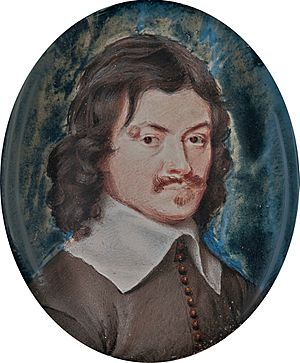William Fairfax (soldier) facts for kids

Sir William Fairfax (1609–1644) was a brave officer who fought for the Parliament's army during the English Civil War. This was a big conflict in England between those who supported the King and those who supported Parliament.
Life and Times
William Fairfax was the second son of Sir Philip Fairfax and Frances Sheffield. His family lived in places called Steeton and Newton Kyme in Yorkshire.
King Charles I made William Fairfax a knight in 1630. This was a special honor. In 1636, he took over his family's lands.
When the English Civil War began in 1642, Sir William chose to support Parliament. He signed a special paper asking the King to trust Parliament. He was given command of a group of soldiers in the army.
Fighting for Parliament
Sir William Fairfax fought in many important battles. At the Battle of Edgehill, his group was on the left side of the army. Later, he joined his uncle, Lord Fairfax, in Yorkshire.
Together, they helped capture the towns of Leeds in January 1643 and Wakefield in May 1643. Sir William was very dedicated to his cause. He once wrote to his wife that he and his cousin, Sir Thomas Fairfax, would "rest neither night nor day" until they had served God against their enemies.
In January 1644, Sir William led a group of horsemen to victory at Nantwich. He also commanded a group of foot soldiers at the big Battle of Marston Moor.
In August 1644, he went to Lancashire with two thousand horsemen. He helped in the siege of Liverpool, which means his army surrounded the city to try and take it.
His Final Battle
Sir William Fairfax was badly hurt during the Relief of Montgomery Castle on September 18, 1644. He died the very next day. It is said he had fifteen wounds. His wife was sad he died, but she was proud he died fighting for what he believed in.
His Family
In 1629, William Fairfax married Frances Chaloner. She was the daughter of Sir Thomas Chaloner. William and Frances had several children. Their children included Thomas (born 1633), William (born 1630), Catherine (born 1634), and Isabella (born 1635).
After Sir William died, Parliament voted to give his wife and children money. This was to help them because he had died serving Parliament.
 | Bayard Rustin |
 | Jeannette Carter |
 | Jeremiah A. Brown |

